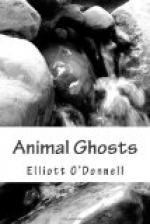Round about Leeds the spectre dog is called “Padfoot,” and is about the size of a donkey, with shaggy hair and large eyes like saucers. My friend Mr. Barker tells me there was, at one time, a ghost in the Hebrides called the Lamper, which was like a very big, white dog with no tail. It ran sometimes straight ahead, but usually in circles, and to see it was a prognostication of death. Mr. Barker, going home by the sea-coast, saw the Lamper in the hedge. He struck at it, and his stick passed right through it. The Lamper rushed away, whining and howling alternately, and disappeared. Mr. Barker was so scared that he ran all the way home. On the morrow, he learned of his father’s death.
In Northumberland, Durham, and various parts of Yorkshire, the ghost-dog, which is firmly believed in, is styled Barguest, Bahrgeist, or Boguest; whilst in Lancashire it is termed the Boggart. Its most common form in these counties is a large, black dog with flaming eyes; and its appearance is a certain prognostication of death.
According to tradition there was once a “Barguest” in a glen between Darlington and Houghton, near Throstlenest. Another haunted a piece of waste land above a spring called the Oxwells, between Wreghorn and Headingley Hill, near Leeds. On the death of any person of local importance in the neighbourhood the creature would come forth, followed by all the other dogs, barking and howling. (Henderson refers to these hauntings in his Folk-lore of Northern Counties.)
Another form of this animal spectre is the Capelthwaite, which, according to common report, had the power of appearing in the form of any quadruped, but usually chose that of a large, black dog.
“The Mauthe Doog”
One of the most famous canine apparitions is that of the “Mauthe Doog,” once said—and, I believe, still said—to haunt Peel Castle, Isle of Man.
Its favourite place, so I am told, was the guard-chamber, where it used to crouch by the fireside. The sentry, so the story runs, got so accustomed to seeing it, that they ceased to be afraid; but, as they believed it to be of evil origin, waiting for an opportunity to seize them, they were very particular what they said or did, and refrained from swearing in its presence. The Mauthe Doog used to come out and return by the passage through the church, by which the sentry on duty had to go to deliver the keys every night to the captain. These men, however, were far too nervous to go alone, and were invariably accompanied by one of the retainers. On one occasion, however, one of the sentinels, in a fit of drunken bravado, swore he was afraid of nothing, and insisted on going alone. His comrades tried to dissuade him, upon which he became abusive, cursed the Mauthe Doog, and said he would d——d well strike it. An hour later, he returned absolutely mad with horror, and speechless; nor could he even make signs, whereby his friends could understand what had happened to him. He died soon after—his features distorted—in violent agony. After this the apparition was never seen again.




